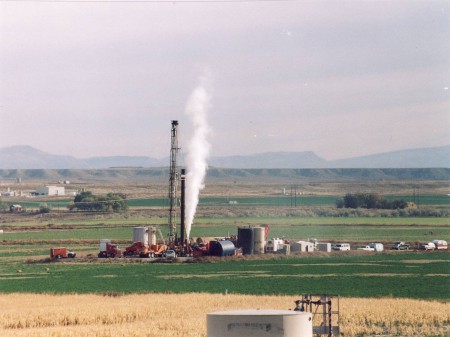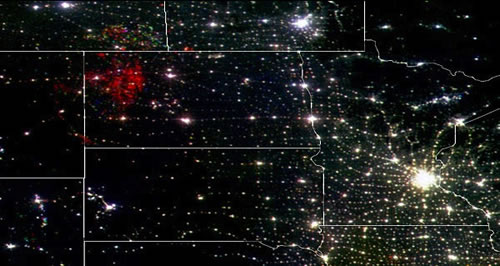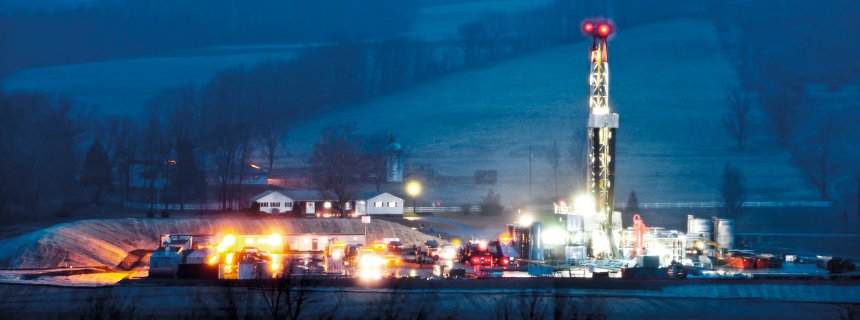
GOLD!

In a time when a rush for cleaner and cheaper energy sources worldwide have come nearly parallel in importance, the idea that such an energy source would be a ‘goldmine’ should come as no shock.
Take the city of Williston, North Dakota; it is a modern example of the gold rush that occurred in the west during the 1800’s. The city has doubled its sitting population almost overnight, and prices for living space and rent have skyrocketed to near major metropolis prices (ex. 1200 a month for mobile-home parking.) This is because the city is literally oozing with natural gas…so much so they have to burn the excess gas coming from the ground. The economy in the state is booming tremendously, and it will also impact the economy of the nation as it works its way across state borders and into markets across the state…and perhaps the globe. Take this article’s writing on the specifics of the situation:
“North Dakota now has virtual full employment, and the state budget showed an estimated surplus of $1.6 billion in 2012. Truck drivers in the state make $100,000 a year, while the strippers being brought in from Las Vegas rake in more than $1,000 a night. President Barack Obama calls the discovery of Bakken and similar shale gas formations in Texas, Colorado, Pennsylvania, Louisiana and Utah a “stroke of luck,” saying: “We have a hundred years’ worth of energy right beneath our feet.”

Our world has come to a point where energy is at a premium in the market, with costs for such high commodities as crude oil affecting citizens of all nations. Energy is business, and now business (particularly in North America) is very, very good! America’s energy market is undoubtedly the largest in terms of both demand and supply across the board (such as coal, wind, solar, gas, oil, etc), and the news in the last few months concerning our energy and fuel has been very promising; we are set to be the world’s leading oil producer in a matter of 5 years (1), and now we are the leader in the production of natural gas. Why? The use of Hydraulic Fracturing, and how it can (and perhaps will) benefit America in the very coming months….while also creating downsides due to conflicting energy sources.
Let us start with the obvious good an abundance of natural gas has done in nearly the last year: low consumer energy costs. Thanks to fracking, America’s abundance of natural gas in energy companies’ coffers have driven down the cost dramatically, making our energy bills at home much cheaper (assuming you use natural gas, of course). A simple look at the market listings for commodities show that natural gas current cost hovers around 3 dollars and 30 cents (2,3).
How can any of that be bad news? Doesn’t everyone want to pay less? Well of course…but the true issue lies in the competition…specifically coal. The Wall Street Journal reports,
Cheap natural gas has prompted utility companies to burn more of it and less coal, which has eroded coal prices. Both industries have been hit by weaker demand for power, partly as a result of warm winter months early this year …”On the coal side, it’s really taken a huge bite out of their business,” said Steve Piper, associate director at SNL Energy, a research firm” (4)
Any hit to the coal industry will be one that causes some kind of suffering…even if the end result does benefit the economy in the long run. These growing pains are due largely in part to the fact that coal supplies a majority of Americans with power, 42 percent in fact with natural gas being second at around 24% (5). Only time will reveal the results of balancing job growth and decline due to natural gas booms, as well as the supply and demand scale for said energy.
Another plus and minus to discuss with natural gas booming is the global impacts. I say impacts because there are a multitude of ways to see the global view on natural gas, but I chose to cover two; the exporting of excess gas and the competing nations in energy production. Should America ship this gas across the globe? Gas companies say yes, American consumers say no. The issue of allowing gas companies to export their abundant supplies abroad is feared to drive costs up dramatically from their near-historic lows currently…something the average American consumer does not want to see go away. I cannot blame them….cheaper is better…but at what principled cost?
The fix to this would be having government restrictions on companies exporting the gas. Morally i do not agree with this, as enterprise and government should be separate, but on a mixed practical/principled level the restrictions would do more harm than good, as caps on who to trade with and how much tend to drive up costs regardless due to lack of a competitive market …forcing a monopolized cartel in the future(after all, the 21st century is all about global markets now).(6) The nay-sayers to exports also worry about the demand for natural gas simply being too much to handle for our nation’s gas suppliers. These are great issues to be debated in the months to come, as the future of this energy source is traveling at very high speeds with thoughtful discussions needing to occur.
The supplemental issue, based on the assumption the US does export its abundance of natural gas, is how the energy competitors will react. With America expected to take over as leaders of both the natural gas market in tow years, and crude oil/petroleum in 5 (7), nations like Russia and Saudi Arabia are keeping a watchful eye on the American energy market. On the competition,
“The Russians could be on the losing end of the stick. The power of President Vladimir Putin is based primarily on oil and gas revenues. If energy prices decline in the long term, bringing down Russian revenues from the energy sector, Putin’s grip on power could begin to falter. The Americans’ sudden oil and gas riches are also not very good news for authoritarian regimes in the Middle East….But now the American natural resources boom threatens Putin’s dreams of an imperial resurrection of his country. It is already struggling with falling gas prices.”

“Leave Bond to me!”
Global competition appears to be shifting away from the East and back to the West…..THAT might be the biggest issue we see this decade. Will America be a leading exporter of energy versus its lead in import? Will other nations across the globe cash in with fracking technology as well to the levels the US might see (see Argentina, Germany, China, etc). The possibilities on fracking and the effects its has on the global future are in-fact endless…..and greatly deserve a watchful eye from folks beyond the scientific community.
Sources:
1) http://www.nytimes.com/2012/11/13/business/energy-environment/report-sees-us-as-top-oil-producer-in-5-years.html?_r=0
2) http://money.cnn.com/data/commodities/
3)http://www.bloomberg.com/energy/
4) http://online.wsj.com/article/SB10000872396390444592704578066964123991082.html
5)http://www.eia.gov/electricity/monthly/
6) http://www.usnews.com/news/articles/2013/01/10/should-the-us-export-natural-gas
7)http://www.spiegel.de/international/world/new-gas-extraction-methods-alter-global-balance-of-power-a-880546.html











